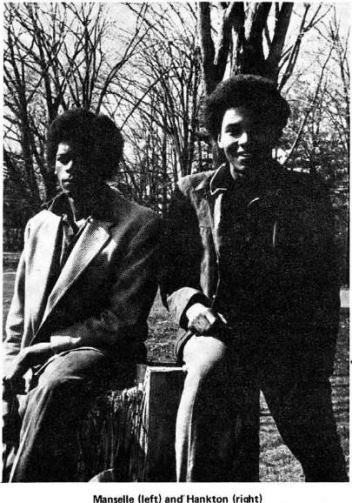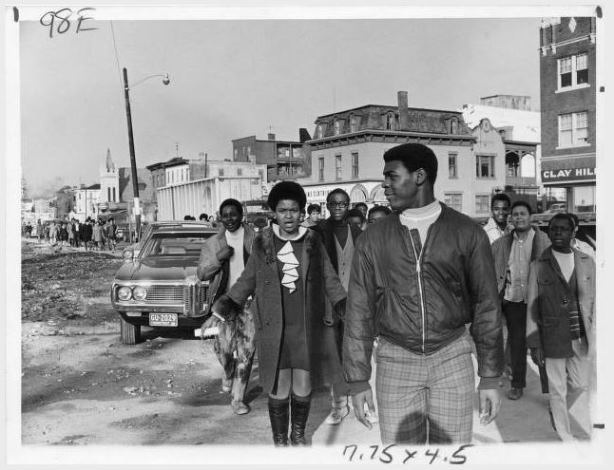By Steve Thornton
May 3 marks World Press Freedom Day, first designated by the UN General Assembly in 1993. Across the globe, students have played a critical role in using and maintaining unrestricted media to promote democracy and justice. Witness, for example, the critical use of social media tools like Twitter and Facebook during the Arab Spring in 2011. Two decades before the UN declaration, however, African American high school students in Hartford decided to teach elected officials something about freedom of the press.
Marcus Manselle was a Weaver High senior who published the student newspaper, the People’s Press. He was first to report that faculty and students began a picketing campaign at the Hartford Chamber of Commerce on February 7, 1969, to protest a proposed $3.5 million cut to the Board of Education budget. At first, the Hartford Courant actually relied on Manselle’s reporting to learn about the source of all the commotion.
Students wrote and published the “underground” newspaper at their own expense, and distribution took place on school property, without official approval. Hartford’s corporation counsel ruled that the paper was “hate literature,” filled with “racist” and “obscene” language, but in fact, the students were speaking out about student rights, irrelevant education, and their alienation from school and society.
Punishing Weaver High School Publishers
The Weaver administration informed Manselle and two other students that they had to stop handing out the paper. The three publishers refused. The Board of Education suspended all three students on February 21, without bothering to engage the students in a discussion about their activity. Administrators forced Manselle into “home instruction” during his suspension. Even after the other two students received permission to return to school, Manselle’s discipline continued.

Marcus Manselle (left) and Hankton (right) from the article “Weaver Students Suspended: America is Wonderful” in the April 9, 1969, issue of the UH News: Liberated Press
The newspaper did not stop publishing, however. It surfaced again in April with more support than ever: students, teachers, and the Ebony Businessmen’s League all spoke out for Manselle and criticized the students’ suspensions. The 120-member Weaver Student Senate backed Manselle and raised many of the demands that he championed. Parents and alumni also met to support the cause, and the University of Hartford’s student newspaper, UH News/Liberated Press, followed the story, published Manselle’s essays, and even listed Manselle as a staff member. A state judge refused to issue an injunction on Manselle’s discipline, however, despite a 1968 US Supreme Court decision upholding the right of Iowa students to wear black armbands after Martin Luther King’s assassination.
On May 1, another issue of the People’s Press was ready for distribution, this time on the Blue Hills Avenue sidewalk in front of Weaver High. Students also leafleted at city hall and urged Mayor Ann Uccello to support their fight. She replied that the issue was not within her jurisdiction. The Weaver student senate then took the controversy to the Board of Education office, calling for Manselle’s reinstatement and the establishment of a student court for reviewing and overturning disciplines.
Students Strike for Free Speech
On May 27, after finding themselves stonewalled at every level of city government, 500 Weaver students went on strike for three days. Strikers urged those still inside the school to join them, and more students left class. They marched to the Board office on High Street. They tried to join a Board-faculty meeting but authorities refused to admit them. An exasperated Board president, Alfred Rogers, told the strikers, “I want nothing more to do with you.”
The fight continued into June. Finally, with the help of local NAACP president, Wilber Smith, a working group of students, parents, school officials, and Board members hammered out a resolution. The proposal allowed on-campus distribution of independent publications as long as the publications did not “inflame or incite” students or interfere with normal school business. Marcus Manselle’s suspension continued, however. He did not graduate with his class.
Weaver High School was renovated in 1976 and rechristened the Martin Luther King Jr. elementary school. The keynote speaker at the Hartford school’s rededication was Dr. King’s niece, Alberta King Neale, an Atlanta journalist. It seemed fitting, as it was Dr. King, speaking at the 1963 March on Washington, who told the crowd, “Somewhere I read of the freedom of press. Somewhere I read that the greatness of America is the right to protest for right.”
Steve Thornton is a retired union organizer who writes for the Shoeleather History Project (shoeleatherhistoryproject.com)









